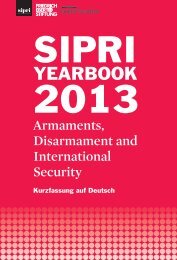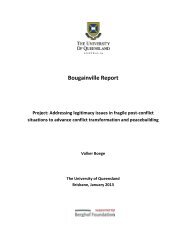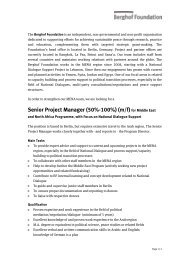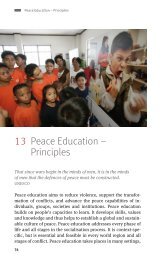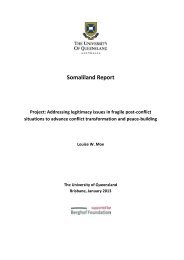Peace and Conflict Transformation Research - Berghof Foundation
Peace and Conflict Transformation Research - Berghof Foundation
Peace and Conflict Transformation Research - Berghof Foundation
Create successful ePaper yourself
Turn your PDF publications into a flip-book with our unique Google optimized e-Paper software.
<strong>Peace</strong> <strong>and</strong> <strong>Conflict</strong> <strong>Transformation</strong> <strong>Research</strong><br />
simplistic linear phenomena that start, escalate <strong>and</strong> stop for all<br />
actors <strong>and</strong> all sectors in the same way. They need to be comprehended<br />
in their interdependent <strong>and</strong> systemic dimensions <strong>and</strong> in<br />
their dynamic nature.<br />
<strong>Research</strong> <strong>and</strong> practice informing each other<br />
<strong>Conflict</strong> transformation research does not encompass a gr<strong>and</strong><br />
theory, but generates theory elements from field research <strong>and</strong><br />
from close interaction with practitioners <strong>and</strong> the conflicting parties<br />
themselves. Nevertheless, it is theory-guided. Of particular<br />
importance is theorising that addresses the differences between<br />
inter-personal <strong>and</strong> inter-group → conflict transformation, <strong>and</strong><br />
between symmetrical <strong>and</strong> asymmetrical conflicts. Moreover,<br />
research on conflict transformation incorporates knowledge<br />
of various disciplines (beginning with political science, peace<br />
<strong>and</strong> conflict studies, sociology <strong>and</strong> social psychology, history,<br />
anthropology, ethnology, law, communication, educational science/peace<br />
education <strong>and</strong> more).<br />
<strong>Conflict</strong> transformation research can be considered a specific<br />
str<strong>and</strong> of peace <strong>and</strong> conflict research which pays particular attention<br />
to bringing about supportive conditions for practical<br />
progress in peacebuilding. It starts from the premise that concepts<br />
<strong>and</strong> theory must evolve in a continuous, reflective <strong>and</strong> critical<br />
exchange with practice, which requires putting concepts to<br />
the test in concrete settings <strong>and</strong> debating their validity with practitioners<br />
from many backgrounds <strong>and</strong> in many localities. Strong<br />
links to the field of policy are also required. In brief: theoretical<br />
approaches should contribute to developing new political <strong>and</strong><br />
social strategies, <strong>and</strong> conflict transformation practice should inspire<br />
considerations on theory.<br />
Any active participation by conflicting parties, practitioners <strong>and</strong><br />
policy-makers in research necessitates paying respect to the diversity<br />
of actors’ stakes. By bringing the actors to the fore, deeper<br />
socio-cultural <strong>and</strong> behavioural aspects of action <strong>and</strong> decision-<br />
66



